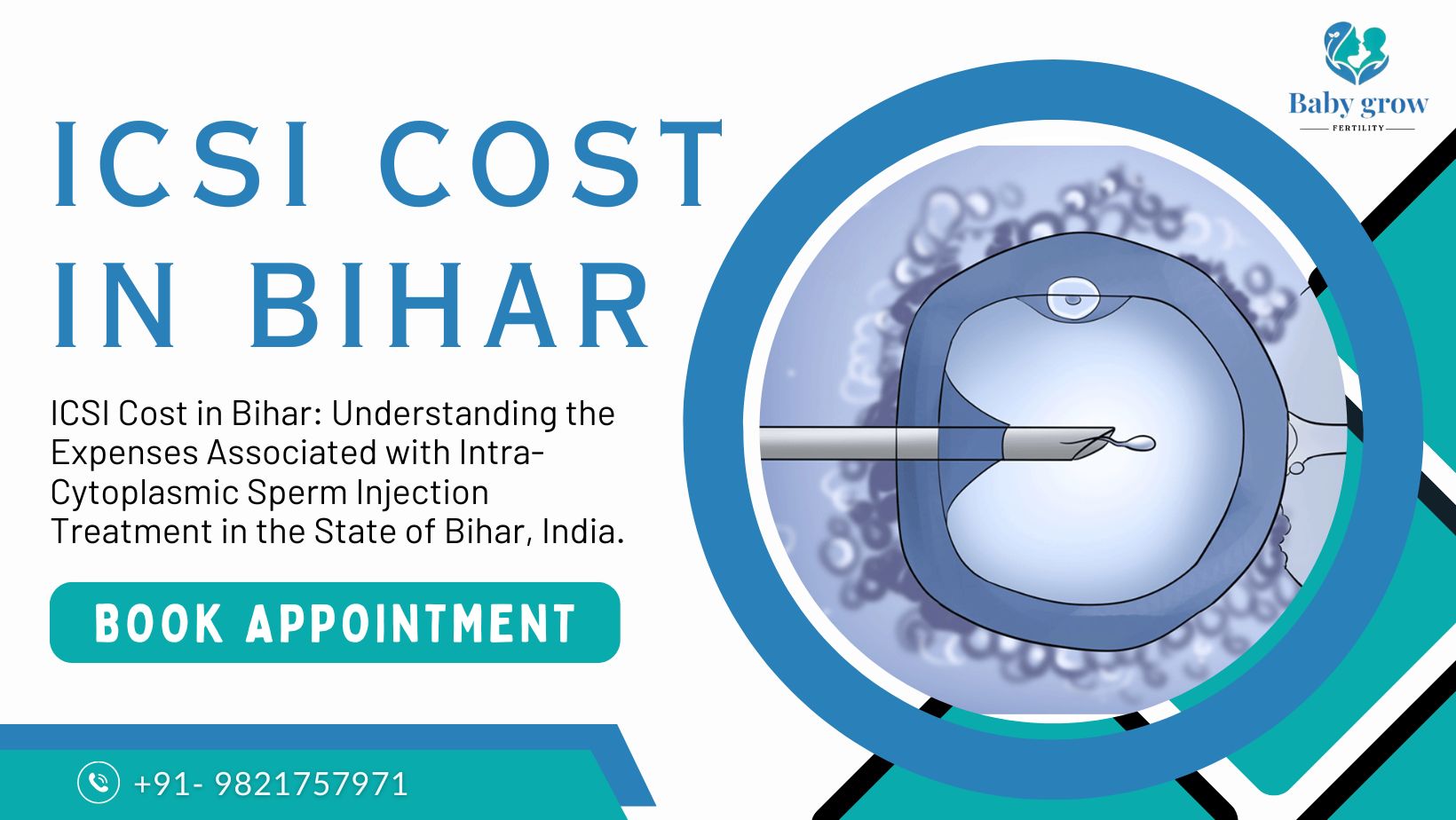Welcome to Baby Grow Fertility, your trusted resource for fertility solutions. Today, we shed light on the important topic of ICSI cost in Bihar. Intracytoplasmic Sperm Injection (ICSI) is a specialized fertility treatment used to address male infertility issues.
In Bihar, accessing fertility treatments like ICSI is a significant consideration for many couples embarking on their journey to parenthood. Understanding the costs associated with ICSI in Bihar is essential for individuals and couples to make informed decisions about their fertility treatment options. Factors such as clinic reputation, medical expertise, and additional services provided can influence ICSI costs.
At Baby Grow Fertility, we aim to provide clear insights into the financial aspects of fertility treatments like ICSI in Bihar, empowering individuals and couples to navigate their fertility journey with confidence. Stay with us as we delve deeper into the intricacies of ICSI cost in Bihar, helping you take the next steps towards realizing your dream of parenthood.
What is ICSI Treatment?
Intra-Cytoplasmic Sperm Injection (ICSI) is an advanced fertility treatment method utilized in assisted reproductive technology (ART) to address male infertility issues. It involves the direct injection of a single sperm cell into the cytoplasm of an egg to facilitate fertilization. Unlike traditional in vitro fertilization (IVF), where sperm and eggs are mixed together in a laboratory dish and fertilization occurs naturally, ICSI offers a more direct approach, particularly beneficial for couples facing male factor infertility challenges such as low sperm count, poor sperm motility, or abnormal sperm morphology. ICSI treatment aims to increase the chances of fertilization by bypassing barriers that may hinder the sperm’s ability to penetrate the egg membrane, ultimately assisting couples in achieving pregnancy.
Detailed Explanation of the ICSI Procedure
Intra-Cytoplasmic Sperm Injection (ICSI) is a specialized technique used in Assisted Reproductive Technology (ART) to treat infertility. During ICSI, a single sperm is injected directly into an egg to facilitate fertilization. Here’s a step-by-step breakdown of the ICSI procedure:
- Ovarian Stimulation: The female partner undergoes hormonal therapy to stimulate the ovaries and produce multiple eggs.
- Egg Retrieval: Once the eggs reach optimal maturity, they are retrieved from the ovaries through a minor surgical procedure called follicular aspiration.
- Sperm Collection: Meanwhile, the male partner provides a semen sample, which is processed to isolate the healthiest sperm.
- Sperm Injection: Using a specialized microscope and micromanipulation tools, a single sperm is carefully injected into the cytoplasm of each mature egg.
- Incubation: The fertilized eggs (embryos) are cultured in a laboratory for several days to allow them to develop.
- Embryo Transfer: One or more viable embryos are selected and transferred into the woman’s uterus, typically through a thin catheter inserted into the cervix.
How Does ICSI Work?
The ICSI procedure involves several steps:
- Sperm Retrieval: Prior to the ICSI procedure, sperm is typically collected through techniques such as ejaculate collection, testicular sperm extraction (TESE), or sperm aspiration.
- Egg Retrieval: Simultaneously, mature eggs are retrieved from the female partner through a minimally invasive surgical procedure known as transvaginal ultrasound-guided egg retrieval.
- Preparation of Eggs: The retrieved eggs are then carefully examined and prepared for the injection process. This involves removing surrounding cells and debris to ensure optimal conditions for fertilization.
- Sperm Injection: Using a specialized micromanipulation technique, a single sperm cell is selected and immobilized using a fine glass needle. The immobilized sperm is then delicately injected directly into the cytoplasm of the prepared egg under a high-powered microscope.
- Incubation and Fertilization: Following the injection, the fertilized eggs (embryos) are placed in a controlled laboratory environment and monitored for signs of successful fertilization. Embryos typically undergo cell division and development over the next few days.
- Embryo Transfer: Once viable embryos have reached a suitable stage of development, one or more embryos are transferred into the woman’s uterus during a minor outpatient procedure, with the goal of achieving pregnancy.
Role of ICSI in Overcoming Male Infertility
ICSI plays a crucial role in overcoming male infertility by providing a solution for couples struggling to conceive due to sperm-related problems. Unlike traditional IVF, where sperm must penetrate the egg on its own, ICSI ensures that fertilization occurs by directly injecting a healthy sperm into the egg. This technique enables couples with male factor infertility to achieve pregnancy, offering hope and opportunities for parenthood where natural conception may not be possible.
Preparing for ICSI Treatment
In preparation for undergoing ICSI treatment, it’s crucial to embark on several essential steps.
Initial Consultation with a Fertility Specialist: Initially, scheduling an appointment for a consultation with a fertility specialist is paramount. During this consultation, the specialist will delve into your medical history, assess any existing fertility concerns, and discuss the intricacies of the ICSI procedure. This consultation serves as an opportunity for you and your partner to ask questions, express concerns, and gain a comprehensive understanding of what to expect throughout the treatment process. The fertility specialist will outline the steps involved in ICSI treatment and tailor a plan to suit your specific needs and circumstances.
Diagnostic Tests and Evaluations: Following the initial consultation, the next phase involves undergoing a series of diagnostic tests and evaluations. These tests are essential for identifying any underlying factors contributing to infertility and determining the most appropriate course of action for treatment. Diagnostic tests may include semen analysis for the male partner, ovarian reserve testing for the female partner, hormone level assessments, and imaging studies such as ultrasound scans to evaluate reproductive organs. The results of these tests provide valuable insights that aid in devising an effective treatment strategy and optimizing the chances of success with ICSI.
Financial Considerations and Insurance Coverage: Alongside medical considerations, it’s essential to address the financial aspects of ICSI treatment. Understanding the costs associated with the procedure and exploring available financial resources is crucial for making informed decisions. This involves discussing the fees associated with clinic services, laboratory tests, and medications with the fertility clinic. Additionally, exploring insurance coverage for infertility treatments is important, as some insurance plans may offer partial or full coverage for ICSI treatment. Evaluating financial considerations and exploring available insurance coverage options ensures that you are adequately prepared to navigate the financial aspects of ICSI treatment and make choices that align with your budget and resources.
ICSI Cost in Bihar
The Cost of ICSI in Bihar typically ranges from INR 90,000 to INR 150,000. This includes the initial consultation, medication, laboratory fees, and the procedure itself. However, prices may vary depending on the clinic’s location, the expertise of the medical team, and any additional services required. It’s essential to inquire about all the expenses involved in the ICSI treatment and ensure transparency regarding the total cost. While fertility treatments can represent a significant financial investment, many clinics offer payment plans or financing options to help make them more accessible to individuals and couples seeking assistance in their journey towards parenthood.
Factors Affecting ICSI Success Rates
Quality of Eggs and Sperm: The success of ICSI heavily relies on the quality of both the eggs and sperm involved in the fertilization process. High-quality eggs and sperm are essential for successful embryo development and implantation. Factors such as genetic health, morphology (shape), and motility (movement) of sperm, as well as the maturity and integrity of eggs, contribute to their quality. Poor-quality eggs or sperm may lead to fertilization failure or result in embryos with developmental abnormalities, reducing the chances of successful pregnancy following ICSI treatment.
Maternal Age: Maternal age is a critical determinant of ICSI success rates. Women’s fertility declines with age due to various factors such as diminished ovarian reserve, decreased egg quality, and increased chromosomal abnormalities in eggs. Generally, women over the age of 35 may experience decreased fertility and a higher risk of miscarriage. As maternal age increases, the success rates of ICSI treatment may decrease, highlighting the importance of considering age-related factors when undergoing fertility treatments.
Previous IVF/ICSI Cycles: The success of ICSI treatment can also be influenced by the number of previous IVF (In Vitro Fertilization) or ICSI cycles a couple has undergone. Multiple unsuccessful fertility treatments can impact factors such as ovarian response, embryo quality, and uterine receptivity, which are crucial for successful pregnancy outcomes. Couples with a history of unsuccessful IVF or ICSI cycles may face challenges such as reduced ovarian reserve, poor embryo quality, or implantation issues, potentially lowering the success rates of subsequent treatment cycles. Understanding the impact of previous treatment experiences is essential for managing expectations and optimizing the chances of success in future ICSI cycles.
Conclusion
In conclusion, while the Cost of ICSI in Bihar varies depending on several factors, including clinic location, medical expertise, and additional services provided, it’s evident that accessing fertility treatments like ICSI is a significant consideration for many couples in the region. Despite the financial implications, the opportunity to pursue ICSI offers hope to individuals and couples facing infertility challenges. By understanding the various factors influencing ICSI costs and making informed decisions, individuals can take proactive steps towards achieving their dream of parenthood. Baby Grow Fertility remains committed to providing support and guidance throughout this journey, empowering couples to navigate the complexities of fertility treatment with confidence and optimism.




